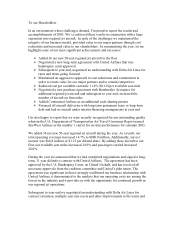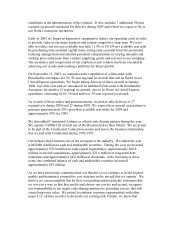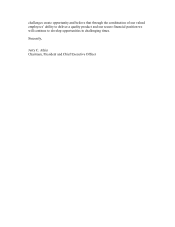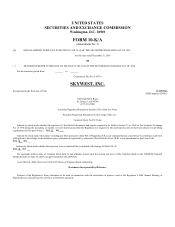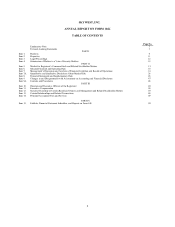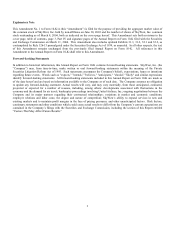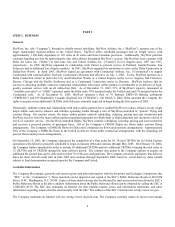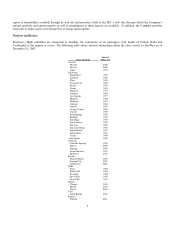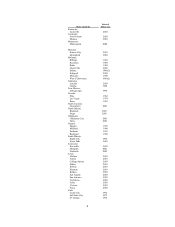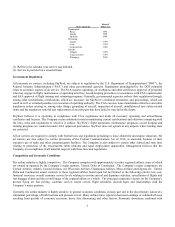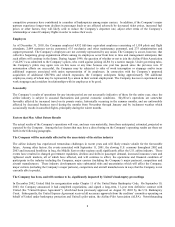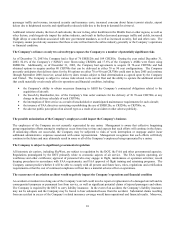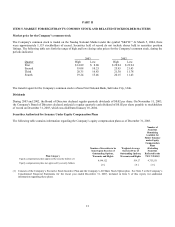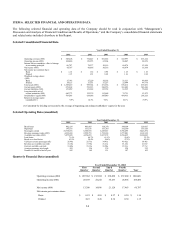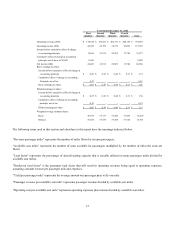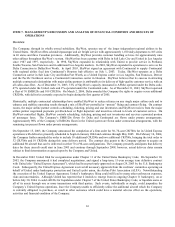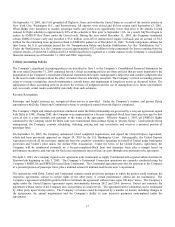SkyWest Airlines 2003 Annual Report Download - page 10
Download and view the complete annual report
Please find page 10 of the 2003 SkyWest Airlines annual report below. You can navigate through the pages in the report by either clicking on the pages listed below, or by using the keyword search tool below to find specific information within the annual report.
State and City
Served
Since (1)
Washington:
Pasco 1996
Seattle 1998
Spokane 1999
Wyoming:
Casper 1994
Cody 1995
Jackson Hole 1986
Canada:
Calgary 1999
Vancouver B.C 1997
Winnipeg 2003
(1) Refers to the calendar year service was initiated.
(2) Service is provided on a seasonal basis.
Government Regulation
All interstate air carriers, including SkyWest, are subject to regulation by the U.S. Department of Transportation (“DOT”), the
Federal Aviation Administration (“FAA”) and other governmental agencies. Regulations promulgated by the DOT primarily
relate to economic aspects of air service. The FAA requires operating, air worthiness and other certificates; approval of personnel
who may engage in flight, maintenance or operating activities; record-keeping procedures in accordance with FAA requirements;
and FAA approval of flight training and retraining programs. Generally, governmental agencies enforce their regulations through,
among other mechanisms, certifications, which are necessary for SkyWest’s continued operations, and proceedings, which can
result in civil or criminal penalties or revocation of operating authority. The FAA can also issue maintenance directives and other
mandatory orders relating to, among other things, grounding of aircraft, inspection of aircraft, installation of new safety-related
items and the mandatory removal and replacement of aircraft parts that have failed or may fail in the future.
SkyWest believes it is operating in compliance with FAA regulations and holds all necessary operating and airworthiness
certificates and licenses. The Company incurs substantial costs in maintaining current certifications and otherwise complying with
the laws, rules and regulations to which it is subject. SkyWest’s flight operations, maintenance programs, record keeping and
training programs are conducted under FAA approved procedures. SkyWest does not operate at any airports where landing slots
are restricted.
All air carriers are required to comply with federal laws and regulations pertaining to noise abatement and engine emissions. All
air carriers are also subject to certain provisions of the Federal Communications Act of 1934, as amended, because of their
extensive use of radio and other communication facilities. The Company is also subject to certain other federal and state laws
relating to protection of the environment, labor relations and equal employment opportunity. Management believes that the
Company is in compliance in all material respects with these laws and regulations.
Competition and Economic Conditions
The airline industry is highly competitive. The Company competes with approximately six other regional airlines, some of which
are owned or operated by the Company’s major partners, United, Delta or Continental. The Company’s major competitors are
Comair Airlines, Atlantic Coastal Airlines, Air Wisconsin Airlines, Chautauqua Airlines, Mesa Airlines and Express Jet. United,
Delta and Continental award contracts to these regional airlines based upon but not limited to the following criteria; low cost,
financial resources, overall customer service levels relating to on-time arrival and departure statistics, cancellation of flights and
lost baggage claims and the overall image of the regional airline as a whole. The principal competitive factors on the Company’s
prorate flying are fare pricing, customer service, routes served, flight schedules, aircraft types and relationships with the
Company’s major partners.
Generally, the airline industry is highly sensitive to general economic conditions, in large part due to the discretionary nature of a
substantial percentage of both business and pleasure travel. Many airlines have reported decreased earnings or substantial losses
resulting from periods of economic recession, heavy fare discounting and other factors. Economic downturns combined with
7

